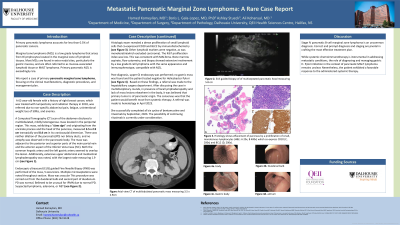Tuesday Poster Session
Category: Biliary/Pancreas
P2926 - Metastatic Pancreatic Marginal Zone Lymphoma: Case Report of a Rare Diagnosis
Tuesday, October 24, 2023
10:30 AM - 4:00 PM PT
Location: Exhibit Hall

Has Audio

Hamed Komeylian, MD
Dalhousie University
Yarmouth, NS, Canada
Presenting Author(s)
Hamed Komeylian, MD, Boris Gala-Lopez, MD, Ashley Stueck, MD, Ali Kohansal, MD
Dalhousie University, Halifax, NS, Canada
Introduction: Pancreatic marginal zone lymphedema is an uncommon occurrence. This case report reviews marginal zone lymphoma as it relates to its clinical presentation, diagnostic work up, and management.
Case Description/Methods: A 62-year-old female with history of right breast cancer treated with lumpectomy and radiation therapy in 2018 was referred for nonspecific abdominal pain, fatigue, anemia without overt Gastrointestinal (G.I.) blood loss, and unintentional weight loss. A Computed Tomography (CT) of the abdomen revealed a 3.5 x 2.9 cm multilobulated mass in the uncinate and pancreatic head with extensive upper abdominal and mediastinal lymphadenopathy.
Initial diagnostic intervention was an endoscopic ultrasound (EUS) guided Fine Needle Biopsy (FNB) of multiseptated pancreatic head measuring 5.8 cm using duodenal bulb and D2 approach was then completed. Pathology was consistent with proliferation of small lymphoid cells positive for CD20 and BCL2, consistent with low-grade B cell lymphoma. The low-grade B cell lymphoma is further defined as an extra nodal marginal zone lymphoma (MALToma). Bone marrow and aspirate immunohistochemistry were CD5 negative, CD10 negative, and indicative of monocytic lymphoproliferative disorder comprising 80% of the cellular marrow with plasmacytic differentiation overall favoring marginal zone lymphoma. Following this diagnosis, a subsequent upper GI endoscopy and biopsy was negative for H. Pylori.
Following assessment by the surgical team, it was determined that due to presence of widespread lymph nodes and distant metastasis, the patient had to be referred to hematology for systemic therapy. Multidisciplinary discussion took place between representatives from hepatobiliary surgery, gastroenterology, hematology, and radiology. As a result, the patient is currently on cycle 2 of 6 of bentamustine and rituximab with consideration of cetuximab for maintenance.
Discussion: Metastatic pancreatic B-cell marginal zone lymphoma is a rare occurrence. Accurate diagnosis and staging are crucial in determining the appropriate treatment strategy. Systemic chemoimmunotherapy plays a central role in managing metastatic disease. There’s a limited role in diagnosis and management of gastric H. Pylori infection. A multidisciplinary approach and close monitoring are essential in assessing treatment response and potential complications. Long-term follow-up is essential for detecting the disease recurrence or transformation and guiding further management decisions.

Disclosures:
Hamed Komeylian, MD, Boris Gala-Lopez, MD, Ashley Stueck, MD, Ali Kohansal, MD. P2926 - Metastatic Pancreatic Marginal Zone Lymphoma: Case Report of a Rare Diagnosis, ACG 2023 Annual Scientific Meeting Abstracts. Vancouver, BC, Canada: American College of Gastroenterology.
Dalhousie University, Halifax, NS, Canada
Introduction: Pancreatic marginal zone lymphedema is an uncommon occurrence. This case report reviews marginal zone lymphoma as it relates to its clinical presentation, diagnostic work up, and management.
Case Description/Methods: A 62-year-old female with history of right breast cancer treated with lumpectomy and radiation therapy in 2018 was referred for nonspecific abdominal pain, fatigue, anemia without overt Gastrointestinal (G.I.) blood loss, and unintentional weight loss. A Computed Tomography (CT) of the abdomen revealed a 3.5 x 2.9 cm multilobulated mass in the uncinate and pancreatic head with extensive upper abdominal and mediastinal lymphadenopathy.
Initial diagnostic intervention was an endoscopic ultrasound (EUS) guided Fine Needle Biopsy (FNB) of multiseptated pancreatic head measuring 5.8 cm using duodenal bulb and D2 approach was then completed. Pathology was consistent with proliferation of small lymphoid cells positive for CD20 and BCL2, consistent with low-grade B cell lymphoma. The low-grade B cell lymphoma is further defined as an extra nodal marginal zone lymphoma (MALToma). Bone marrow and aspirate immunohistochemistry were CD5 negative, CD10 negative, and indicative of monocytic lymphoproliferative disorder comprising 80% of the cellular marrow with plasmacytic differentiation overall favoring marginal zone lymphoma. Following this diagnosis, a subsequent upper GI endoscopy and biopsy was negative for H. Pylori.
Following assessment by the surgical team, it was determined that due to presence of widespread lymph nodes and distant metastasis, the patient had to be referred to hematology for systemic therapy. Multidisciplinary discussion took place between representatives from hepatobiliary surgery, gastroenterology, hematology, and radiology. As a result, the patient is currently on cycle 2 of 6 of bentamustine and rituximab with consideration of cetuximab for maintenance.
Discussion: Metastatic pancreatic B-cell marginal zone lymphoma is a rare occurrence. Accurate diagnosis and staging are crucial in determining the appropriate treatment strategy. Systemic chemoimmunotherapy plays a central role in managing metastatic disease. There’s a limited role in diagnosis and management of gastric H. Pylori infection. A multidisciplinary approach and close monitoring are essential in assessing treatment response and potential complications. Long-term follow-up is essential for detecting the disease recurrence or transformation and guiding further management decisions.

Figure: EUS biopsy of multiseptated pancreatic head mass
Disclosures:
Hamed Komeylian indicated no relevant financial relationships.
Boris Gala-Lopez indicated no relevant financial relationships.
Ashley Stueck indicated no relevant financial relationships.
Ali Kohansal indicated no relevant financial relationships.
Hamed Komeylian, MD, Boris Gala-Lopez, MD, Ashley Stueck, MD, Ali Kohansal, MD. P2926 - Metastatic Pancreatic Marginal Zone Lymphoma: Case Report of a Rare Diagnosis, ACG 2023 Annual Scientific Meeting Abstracts. Vancouver, BC, Canada: American College of Gastroenterology.

